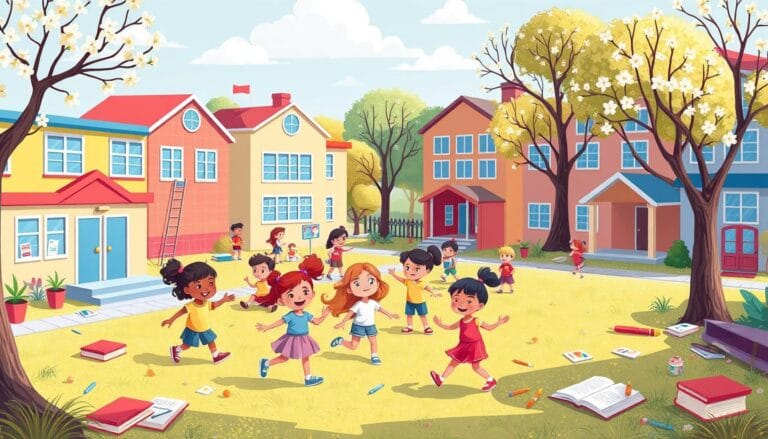Raising children before school age
Being a parent of preschool-aged children is both rewarding and challenging. This guide offers essential insights and practical strategies. It helps support your child’s growth and development during the pre-school years.
It covers understanding developmental milestones and creating a nurturing environment. This article will give you the knowledge and tools for your child’s success before kindergarten.
Key Takeaways
- Gain a deeper understanding of your child’s physical, cognitive, and social-emotional development during the preschool years.
- Learn how to cultivate a nurturing environment that fosters your child’s growth and well-being.
- Discover strategies to prepare your child for a smooth transition into kindergarten, including building academic foundations and developing essential life skills.
- Explore the benefits of play-based learning and how to incorporate engaging activities into your child’s daily routine.
- Understand the importance of establishing daily routines and structure to support your child’s development.
- Receive guidance on selecting the right early education program to meet your child’s unique needs.
Understanding Early Childhood Development Milestones
As your child grows from a toddler into a preschooler, you’ll see amazing changes. These changes happen in their physical, cognitive, and social-emotional growth. Tracking these milestones gives you insights into your child’s progress and helps support their well-being.
Physical Development Markers
Between 3 and 5 years old, kids get better at fine and gross motor skills. They can run, jump, and climb better. They also get better at using small objects, holding a pencil, and doing things like dressing and feeding themselves.
Cognitive Growth Patterns
Preschoolers are always learning. They get better at speaking, solving problems, and remembering things. They love to play, ask lots of questions, and understand things like colors, shapes, and numbers.
Social-Emotional Progress
As preschool children grow, they become more aware of themselves. They learn to express their feelings and make friends. This growth helps them be empathetic, self-controlled, and good at social interactions.
| Developmental Area | Typical Milestones (Ages 3-5) |
|---|---|
| Physical | Improved coordination and balance Ability to manipulate small objects Increased self-care skills |
| Cognitive | Expanding language and communication Developing problem-solving skills Increased memory and attention span |
| Social-Emotional | Greater self-awareness and emotional expression Stronger relationships and social skills Improved empathy and self-regulation |
Knowing these milestones helps parents and caregivers support child development. It ensures toddlers and preschool children get the support they need to grow and thrive.
Creating a Nurturing Environment for Preschool Children
Parenting young children is a journey filled with joys and challenges. Creating a nurturing environment is key to your child’s growth. By focusing on learning through play and preschool activities, you can support their development.
At the preschool age, children soak up new information and experiences eagerly. Set up a space that encourages hands-on exploration and creative expression. Fill their world with toys, books, and art supplies that spark their imagination and help them solve problems.
- Designate a cozy reading nook where your child can dive into their favorite stories.
- Provide a dedicated art area with a variety of materials, from crayons and paints to clay and recycled materials.
- Encourage active play by setting up a safe indoor or outdoor area for physical activities, such as jumping, running, or dancing.
Positive reinforcement and consistent boundaries are crucial. Celebrate your child’s achievements, no matter how small. Guide them with patience and understanding. Set clear rules and routines to make them feel secure and empowered.
| Tips for Nurturing Environment | Benefits for Preschool Children |
|---|---|
| Provide engaging, age-appropriate activities | Supports cognitive, social, and emotional development |
| Offer positive reinforcement and consistent boundaries | Fosters a sense of security and self-confidence |
| Encourage active play and exploration | Promotes physical development and healthy habits |
By creating a nurturing environment that values learning through play and preschool activities, you’re setting your child up for success. Enjoy the journey of parenting and watch your child grow in a supportive space that celebrates their strengths.
Essential Skills for Kindergarten Readiness
As your child gets ready for school, it’s key to focus on kindergarten readiness skills. These skills make starting school easier and help your child succeed in the long run. Let’s look at the main areas your child should work on for a smooth start in early childhood education.
Basic Academic Foundations
Building a strong preschool curriculum foundation is vital. Your child should master skills like:
- Letter and number recognition
- Counting and basic math concepts
- Early writing skills, such as holding a pencil correctly and tracing letters
Self-Help Skills
Self-help skills are key for kindergarten readiness. They help your child be independent and handle classroom routines. Important self-help skills include:
- Dressing and undressing independently
- Practicing good personal hygiene, such as washing hands and using the bathroom
- Opening and closing lunchboxes or containers
Social Interaction Abilities
Strong social skills are also crucial for early childhood education. They help your child interact well with others. Key social skills are:
- Sharing and taking turns
- Following simple instructions and classroom rules
- Expressing emotions and communicating needs effectively
By focusing on these essential skills, you can help your child smoothly enter the kindergarten readiness phase. This sets them up for a positive and enriching educational journey.
Learning Through Play: Activities and Strategies
In the early years, learning through play is key. It helps kids grow and feel good about themselves. Through play, they learn important skills like thinking and getting along with others.
Sensory play is a great way to learn. Let your child play with different textures and sounds. For example, make a “discovery box” with soft, hard, and smooth things. Watch as they enjoy and learn from it.
Imaginative play is also very helpful. Give your child dress-up clothes and toys like kitchens or blocks. They’ll use their creativity and learn to solve problems and talk better.
Playing educational games is fun and good for learning. Try board games, puzzles, or apps that teach numbers, reading, or coding. This makes learning exciting and helps your child love to discover new things.
It’s important to mix structured play with free exploration. Create a safe space where your child can try new things and express themselves. This way, they can enjoy learning and growing.
Establishing Daily Routines and Structure
Parenting young children can be overwhelming. Creating daily routines and structures is key for preschool children and toddlers. It helps them feel secure and grow well.
Morning and Bedtime Rituals
Begin the day with a good morning routine. Include getting dressed, brushing teeth, and eating a healthy breakfast. At night, have a calming bath, read a story, and go to bed on time. These habits help kids feel independent and calm.
Meal Planning and Nutrition
Healthy meals and snacks are vital for toddlers. Plan meals in advance and let your child help. Make mealtime fun and a time to bond with your family. Child nutrition websitehttps://www.aprifel.com/fr/revue-equation-nutrition/fruits-et-legumes-quelles-interventions-pour-augmenter-leur-consommation-chez-les-enfants/?mtm_campaign=Alimentation_enfant_GA&mtm_kwd=Alimentation_enfant_GA&mtm_source=Google&mtm_medium=CPC&gad_source=1&gclid=CjwKCAiAl4a6BhBqEiwAqvrquu-J6gWB6L-hOTJXpWZUQUbipIQrPvfvU9Fa0Z6MU8F8uqhDFCLNMxoC_hIQAvD_BwE
Balanced Activities Schedule
- Set aside time for learning, arts, and outdoor play.
- Also, have free play to encourage creativity.
- Don’t forget breaks and quiet time to avoid burnout.
Creating daily routines and structures is crucial. It gives preschool children the stability they need. With these routines, your child will grow confident and happy.
Choosing the Right Early Education Programs
Choosing the right early education program for your preschool child is key. You’ll find many options, from traditional schools to Montessori and daycare centers. Look at teacher qualifications, curriculum, and facility quality to make a good choice.
When checking preschool curriculum and daycare programs, focus on their educational approach. Seek programs that use hands-on learning and play. Also, make sure teachers are well-qualified and love teaching young children.
Don’t forget to look at the facilities too. They should be safe, clean, and have the right resources for kids. Watch how teachers and students interact. A good program should feel like a community that encourages creativity and emotional growth. By carefully looking at each option, you can find the best fit for your family and give your child a great start in education.
Don’t hesitate to see other articles on my bloghttps://www.skillsraisingkids.com/
FAQ
What are the key physical development milestones for preschool children?
Preschool kids get better at using their hands and fingers. They also improve their balance and control of big muscles.
How can I support my child’s cognitive growth during the preschool years?
Engage your child in activities that boost language, problem-solving, and thinking. Read aloud, play imaginatively, and use educational toys and games.
What social-emotional skills should my preschooler be developing?
Your child should learn to know themselves, feel empathy, and control their feelings. They should also know how to make friends and get along with adults.
How can I create a nurturing environment for children before school age ?
Make a nurturing space by offering fun learning through play. Set routines and boundaries. Give positive feedback and encourage independence in a safe place.
What are the essential skills my child needs to be prepared for kindergarten?
Your child needs to know basic letters, numbers, and how to write. They should also dress themselves and know how to interact with others.
How can I incorporate learning through play into my preschooler’s daily activities?
Use play to teach by doing fun activities like exploring, role-playing, and games. Make sure these activities match your child’s interests and age.
Why are consistent routines important for preschool-aged children?
Routines give kids a sense of security and predictability. They help with emotional well-being and learning to control themselves.
How can I choose the right early education program for my child?
Look at the teachers’ qualifications, the curriculum, and the learning environment. Choose a program that fits your values and offers a nurturing, stimulating space for your child.




